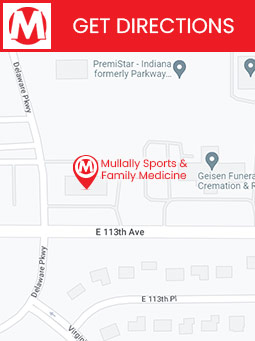Acute and Chronic Illness Treatment Clinic in Crown Point IN
Get specialized diagnosis and treatment for acute and chronic illnesses. The group of experienced doctors and medical staff at Mullally Sports and Family Medicine are here to help and provide the care you are looking for. For more information, please contact us or schedule an appointment online. We are conveniently located at 11275 Delaware Pkwy Suite A, Crown Point, IN 46307.




Table of Contents:
What’s the difference between acute and chronic conditions?
What are the causes of acute and chronic conditions?
What are the symptoms of acute and chronic conditions?
Who treats acute and chronic illnesses?
Acute conditions are characterized by their abrupt and severe onset of symptoms, which typically only last briefly. For example, acute conditions such as the flu, a cold, a sprained ankle, or a broken bone can be extremely painful and uncomfortable but usually go away on their own within a few weeks. Infections, wounds, or other types of trauma often result in acute conditions as they set off the body’s protective mechanisms.
On the other hand, chronic conditions have symptoms that frequently return and are prevalent for 3 months or longer. To help people maintain a good quality of life, chronic conditions require ongoing medical care and management. Diabetes, hypertension, asthma, arthritis, and chronic pain are a few common examples of chronic illnesses.
While acute conditions can be treated quickly, chronic conditions necessitate long-term management, lifestyle adjustments, and ongoing medical attention to control symptoms and avoid further complications. People can manage their health and enhance their quality of life by becoming aware of the signs and causes of these conditions.
Most acute conditions can be traced back to identifiable causes like infections, wounds, or trauma. Infections caused by viruses or bacteria are common causes of acute illnesses such as the flu, strep throat, or pneumonia. Acute conditions like sprains, broken bones and concussions can also result from injuries, whether they are sports-related or brought on by accidents such as falls.
Acute conditions can also result from exposure to toxins or harmful substances. Examples of conditions that can cause sudden and severe symptoms include carbon monoxide poisoning, food poisoning, and allergic reactions to food, medications or insect bites.
The cause of chronic conditions is often a combination of genetic, environmental, and lifestyle factors. Genetics are often at play in causing many chronic diseases such as diabetes, hypertension, and heart disease. Lifestyle choices like smoking, eating poorly, and not exercising also increase the risk of developing a chronic condition.
Chronic conditions are sometimes the result of ongoing exposure to toxins or stress, which can damage the body over time by causing inflammation. In some circumstances, acute conditions that go untreated can also result in chronic health issues. Untreated infections, for example, can harm organs like the heart, liver, or kidneys and cause long-term health issues.
Some of the most common symptoms of acute health conditions include:
• Mild to severe pain
• Flu-like symptoms such as fever, chills, and sore throat
• Difficulty breathing or breathlessness
• Vomiting, nausea and diarrhea
• Dizziness or fainting
• Sore muscles and joints
• Bruising or bleeding
• Inflammation
• Rashes or hives
The flu, the common cold, pneumonia, appendicitis, and allergic reactions are common examples of acute illnesses. Some of the common symptoms associated with chronic illnesses include:
• Persistent fatigue
• Persistent discomfort that lasts for months
• Cough or breathlessness
• Stiffness or joint pain
• Elevated blood pressure
• Elevated blood sugar
• Mood changes
• Digestion problems
• Loss of memory or cognitive dysfunction
Diabetes, arthritis, chronic obstructive pulmonary disease (COPD), heart disease, and multiple sclerosis are some examples of chronic illnesses. It is important to note that these symptoms will vary based on the particular condition and the person’s general health. It is highly urged to consult your doctor if you are exhibiting any symptoms or are worried about your health.
A variety of medical professionals can treat acute and chronic illnesses, depending on the specific condition and its severity. Examples of healthcare professionals who treat acute illnesses include:
• Primary care physicians
• General practitioners
• Urgent care providers
• Emergency room doctors
• Specialists in infectious diseases, cardiology, and pulmonary medicine
• Nurses and nurse practitioners
• Pharmacists
• Occupational therapists
• Physical therapists
Examples of healthcare providers who are involved in treating chronic conditions include:
• Primary care doctors
• General practitioners
• Specialists in the fields of endocrinology, rheumatology, or neurology
• Nurses and nurse practitioners
• Pharmacists
• Registered nutritionists or dietitians
• Occupational therapists
• Physical therapists
• Professionals in mental health, such as psychologists or psychiatrists
A group of medical experts often work together to treat chronic illnesses, delivering comprehensive care that takes into account every aspect of the patient’s health. Primary care doctors, specialists, nurses, and other medical personnel are commonly a part of this team. We serve clients from Crown Point IN, Winfield IN, Schererville IN, St. John IN, Cedar Lake IN, Munster IN, Lowell IN, DeMotte IN, as well as other Northwest Indiana locations.

Check Out Our 5 Star Reviews


Additional Services You May Like

Additional Services You May Like
- Acute and Chronic Illness
- Annual Wellness Exams
- Concussion Management
- Lab Testing
- Medical Weight Loss Management
- Primary Care
- PRP Injections
- Regenerative Cell Therapy
- Same Day Sick Visits
- Shockwave Lab
- Actinic Keratosis
- Allergy Care
- Botox for Migraine
- Cosmetic Skin Treatment
- Cyst Removal
- Ear Wax Removal
- EKG
- Flu Shots
- Fracture
- Immunizations
- Laceration Repairs
- Moles
- Molluscum Contagiosum
- Mullally Medspa Services
- Nebulizer Treatment
- Nutrition And Exercise Management
- Pregnancy Testing
- Pulse Oximetry
- Respiratory Care
- Skin Tag Removal
- Spirometry
- Strep and Flu
- Surgical Clearance
- TB Testing
- Ultrasound Guided Injections
- Warts
- Women’s Health
- X-Ray
- EPAT Therapy
- EMTT Therapy
- Pediatrics



